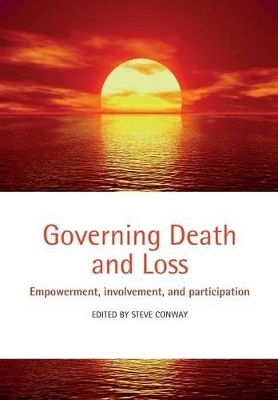
Governing Death and Loss
Oxford University Press (Verlag)
978-0-19-958617-2 (ISBN)
Political, economic, social, cultural and technological changes have led to profound transformations in the ways that death and loss are perceived and managed in contemporary society. Over the last few decades, the long term shift to chronic illness as a major causal factor has significantly increased the time scale of dying. Most people die in institutions and 'care' is typically medical. Many communities and ordinary citizens now relinquish control and involvement to experts in the last stages of life.
At global and local levels, however, new arrangements are emerging to govern the changing face of death, and a reorientation model is being developed to counter claims of the 'creeping medicalisation' of death and dying. With an international authorship and scope, this book illustrates the interlinking nature of society, death and loss, and it gives examples of governance that promotes the empowerment, participation and the increasing need for the involvement of ordinary people and communities in differing social and cultural contexts.
Chapters come from collaborations of academics and practitioners in end of life care - from sociologists, anthropologists or the arts but also from nursing, social work, or medicine. The result is a reflective, academic and practical discussion of the outline of the problem we face in the contemporary governance of death, and an exploration of the critical, theoretical and practice-based ways forward for us all.
Steve Conway is a Senior Lecturer in Research Methods in the School of Health & Social Care at Teesside University. Steve has a background in social science. From 1990 to 2002 he was a Lecturer in Social Science at the University of Lincoln. Between 2002 and 2004 Steve was a Research Manager in the Community Evaluation Research Group, Social Futures Institute at Teesside University. His primary research interests are in health governance including death, dying, loss and care, social attitudes to ageing, illness and death amongst older people, and health inequalities.
Foreword ; Introduction ; PART 1 - THEORISING DEATH AND LOSS ; 1. Death and community ; 2. Contemporary cultures of memorialisation: blending social inventiveness and conformity? ; 3. (Un)Regulating bereavement ; 4. Promoting the self through the arts: the transformation of private testimony into public witnessing ; 5. Involvement and empowerment at the end of life: overcoming the barriers ; 6. Reviving sociability in contemporary cultural practices and concepts of death in Hong Kong ; PART 2 - PRINCIPLES INTO PRACTICE ; 7. The shameful death: implications for public health ; 8. A history of the project on death in America: programmes, outputs, impacts ; 9. Resilient communities ; 10. Transition from conventional to health promoting palliative care: an Australian case study ; 11. Neighbourhood network in palliative care - a public health approach to the care of the dying ; 12. Liberating dying people and bereaved families from the oppression of death and loss in Chinese societies: a public health approach ; 13. Letting it out of the cage: death education and community involvement ; 14. Spirituality and community practice
| Zusatzinfo | 1 black and white line drawing |
|---|---|
| Verlagsort | Oxford |
| Sprache | englisch |
| Maße | 175 x 244 mm |
| Gewicht | 318 g |
| Themenwelt | Geisteswissenschaften ► Psychologie ► Sozialpsychologie |
| Medizin / Pharmazie ► Medizinische Fachgebiete ► Palliativmedizin | |
| Studium ► 1. Studienabschnitt (Vorklinik) ► Med. Psychologie / Soziologie | |
| Sozialwissenschaften ► Soziologie ► Mikrosoziologie | |
| ISBN-10 | 0-19-958617-9 / 0199586179 |
| ISBN-13 | 978-0-19-958617-2 / 9780199586172 |
| Zustand | Neuware |
| Haben Sie eine Frage zum Produkt? |
aus dem Bereich


